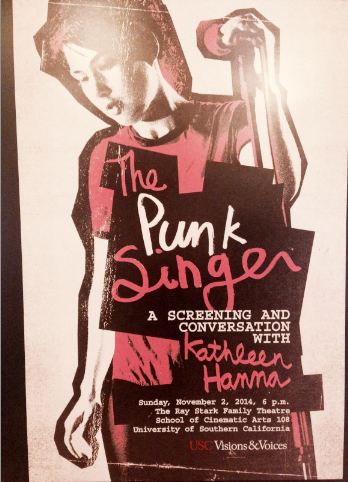Why Kathleen Hanna Will Always Be The Riot Grrrl Queen

In her hips, there's revolutions
When she walks, the revolution's coming
In her kiss, I taste the revolution
- Bikini Kill, "Rebel Girl"
Kathleen Hanna is still queen of the neighborhood. The feminist frontrunner of the 90's Riot Grrrl movement appeared for a candid Q&A following USC's Visions & Voices screening of "The Punk Singer" last night, a 2013 Netflix documentary appropriately titled after the spunky track on Hanna's 1998 solo album, "Julie Ruin."
The Ray Stark Family Theatre at USC's School of Cinematic Arts was packed full of a captivated audience, tapping its feet to the head-banger beats of Hanna's career. The documentary featured a refreshingly honest depiction of Hanna's life, beginning with her emphatic origins as a college student performing spoken word poetry, centering on her controversial fame as the lead singer of punk bands Bikini Kill and Le Tigre, and culminating in her painful and highly personal battle with late stage Lyme Disease.
Hanna strolled swiftly down the aisle of the theater as the end credits rolled across the ceiling-length projector. Sporting a hot pink backpack and a characteristically disheveled up-do, she instantly embodied the tangible energy that surrounds her on the silver screen.
"Sorry," she chirped after planting herself on a chair facing the audience, "We just played San Francisco last night, so I'm a little slow today." At 45, Hanna is continuing the Riot Grrrl legacy with her latest girl group, The Julie Ruin, comprised of herself, Kenny Mellman, Carmine Covelli, Sara Landeau, and fellow Bikini Kill veteran, Kathi Wilcox.
When asked what she felt the film was really about, Hanna somewhat surprisingly responded, "It's about dying." After suffering for six years with an undiagnosed, aggressive case of Lyme's Disease, Hanna operates under the perpetual shadow of mortality - the notion that time is limited. She admirably discards tired social constructs like feminist "labels" and social media platforms; instead, she speaks freely and humbly about her experiences navigating the the blurry intersection between feminism and punk rock.
Kathleen Hanna's outlandish, bold on-stage persona established a new kind of feminist culture, one that provided women with the power to refuse silence, and instead take action. In the film, Hanna is accurately conveyed as a woman who is unafraid to say what she wants, when she wants, simply because she wants to. With this distinctive reputation preceding her, it is commendable that the singer was able to provide quite a three-dimensional snapshot of herself during her post-screening appearance. She possessed a sincerity that seemed to stem from a combination of weathering life experiences and the "Fuck you" attitude that defined a large part of her career.
Hanna recalled both the verbal and physical abuse that she endured in her young life, and how such oppressive and violating circumstances fueled her art as she entered the liberating realm of college. But despite the video reels that portray Hanna - clad in combat boots and a mini skirt - howling and leaping in impassioned movements across brightly lit stages, she admitted that she was not the fearless figure that many fans made her out to be. "A lot of that was false bravado," Hanna nodded matter-of-factly, "I was not a confident person, I just played one on TV." For a while, she remembered feeling much like a performance artist only embodying the role of a lead singer in a band.
Hanna never failed to charm the eager inquirers with a tinge of her feisty flavor. She spoke with an air that seemed so true to her unadulterated self, including an impressively legitimate impression of the rock 'n' roll guru who Hanna credits as her role model, Joan Jett. When asked how she had been influenced by the superstar rock group Nirvana (Kurt Cobain was closely acquainted with the members of Bikini Kill at the onset of his career), Hanna quipped, "Oh, I think the question is more, 'how did I influence them?'"
Kathleen Hanna serves as a striking example of a headstrong, outspoken woman with a genuine affinity for kindness. She embraced audience members before they exited the theater, clasping their shoulders as she told them, "You're so beautiful. We all are." These seemingly inconsequential scenarios, however small, are likely attributes that shaped Hanna into such an empowering leader.
Everyone should heed the self-fulfilling advice of the original rebel girl: "Don't be on your deathbed wondering if you said too much or too little." Hopefully, Hanna's records will continue to speak for themselves.
Kathleen Hanna's latest band, The Julie Ruin, will be performing this evening, Monday, November 3, at 8 p.m. in USC's Bovard Auditorium.
Reach Senior Culture Editor Emily Mae Czachor here.



